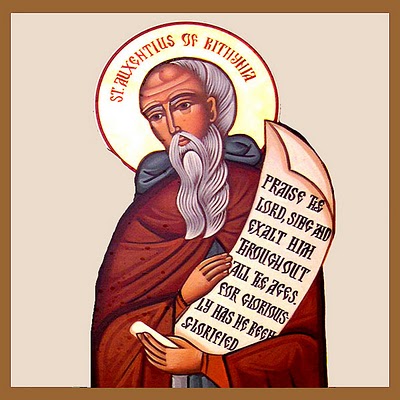 Afxendius' father was a Persian Christian who fled to Syria in 360 AD because of the persecution of Shapur, the Persian king. There he married a Christian woman and they had a son whom they named Afxendius, who grew up with God's blessings. When he was twenty, he went to Constantinople to visit his uncle, an officer in the emperor's army. When he arrived, his uncle had died. Despite this, he remained in the city. Because of his intelligence and intelligence, he was appointed to the king's personal guard with a prestigious rank. However, he did not forget his faith and the laws of the Gospel, but rather memorized and applied them with all piety. He fasted every day until sunset. His spiritual strength was reading the Holy Bible and spiritual books. He did not cease visiting the righteous and monks in Constantinople to join them in prayers and vigils. He crowned his prayers and fasts with acts of mercy, distributing to them everything he owned.
Afxendius' father was a Persian Christian who fled to Syria in 360 AD because of the persecution of Shapur, the Persian king. There he married a Christian woman and they had a son whom they named Afxendius, who grew up with God's blessings. When he was twenty, he went to Constantinople to visit his uncle, an officer in the emperor's army. When he arrived, his uncle had died. Despite this, he remained in the city. Because of his intelligence and intelligence, he was appointed to the king's personal guard with a prestigious rank. However, he did not forget his faith and the laws of the Gospel, but rather memorized and applied them with all piety. He fasted every day until sunset. His spiritual strength was reading the Holy Bible and spiritual books. He did not cease visiting the righteous and monks in Constantinople to join them in prayers and vigils. He crowned his prayers and fasts with acts of mercy, distributing to them everything he owned.
When he reached the age of thirty, he realized that his life was in complete adherence to God, so he left the army and went to a deserted mountain ten miles from Constantinople. There he became a solitary and lived an angelic life, persevering in prayers and living a harsh ascetic life, but divine providence bestowed upon him the gift of healing and performing miracles, so people flocked from all over to see him and ask for healing at his hands or to listen to his spiritual guidance. As for him, he remained in his closed cell and would extend his hand through a window in the door of the cell to touch the sick and anoint them with holy oil. Sometimes he would use the cross tied to the head of his staff to touch the sick and heal them. Everyone who invoked the name of the Lord Jesus upon him was healed of his illness.
When the Fourth Ecumenical Council was held in 451, in the city of Chalcedon, to consider the heresy of Eutyches, who said that there is only one divine nature in Christ, the fathers of this council insisted that Auxentius should attend the council, due to his holiness, in order to present with them the truth of the faith. He refused to come because he preferred asceticism, so the delegates carried him on his bed because he was unable to walk due to his extreme weakness resulting from the severity of asceticism. Thus, he attended the council and denounced with the fathers the heresies of Nestorius and Eutyches, and declared with them the belief in the divine and human natures of Christ as taught by the fathers. In Chalcedon his fame spread, and people flocked to hear his instructions and receive healings. It is believed that he was ordained a priest in Chalcedon.
After the council, Afxendius did not return to his mountain, but rather headed to a mountain near Chalcedon, which was higher, colder, and more difficult to reach. He built a wooden cell inside a cave and practiced asceticism there. Despite this, people came to him, but he did not skimp on miracles. He preached, guided, and taught the way of salvation to whoever came to him, so many decided to become ascetics in a village in the cells on the same mountain, following his teachings, guidance, and virtues. Many monasteries were built, including a women’s monastery with nearly seventy nuns, headed by Saint Elphtharia, who would always come to listen to him and receive the Holy Mysteries from him.
The righteous Auxendius continued in this behavior until he passed away in peace on February 14, 470, and went to eternal happiness to receive the reward of his virtuous deeds. As for his body, it was buried in the monastery of the virgin nuns, and his grave became a source of healing for every believer seeking God’s grace.
On February 14, the Holy Church commemorates our righteous father Auxendius, who was famous in the fifth century for his virtuous life, sublime holiness, and the performance of miracles.
Through his intercession, O God, have mercy on us and save us. Amen.
Troparia in the first tune
You appeared in the wilderness as a settler, and in the body as an angel, and as a wonderworker, and through fastings, vigils, and prayers, you received heavenly gifts, for you heal the sick and the souls of those who rush to you in faith, O our God-bearing father Euxendios. Glory to him who gave you strength, glory to him who crowned you, glory to him who works healing for all through you.
Qandaq with the second tune
When you, O God-bearer, enjoyed abstinence and curbed the lusts of the flesh, you appeared fruitful through your faith, and blossomed like a plant in the midst of Paradise, O all-pure Father Euxendius.


